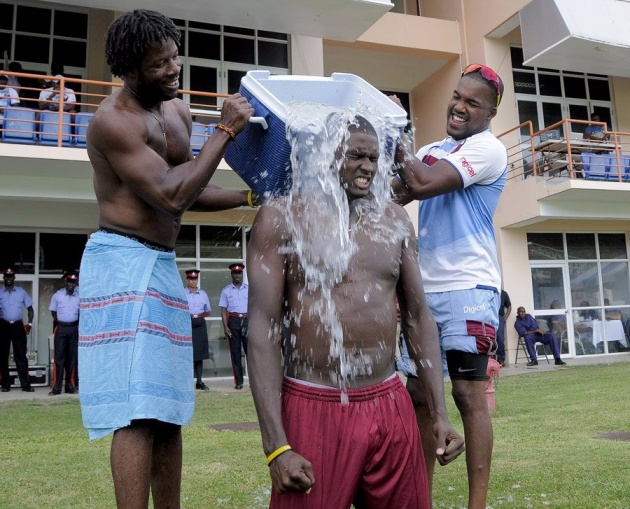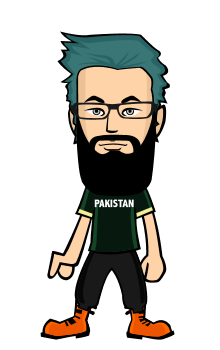The rise of an unlikely leader

Jason Holder was made West Indies ODI captain on December 20, 2014. But it was only almost a month later that he actually became their leader.
On January 16, 2015, Holder led his men out to face South Africa in their first 50-over contest since the abandoned tour to India and their last series before the World Cup. He was asked to field first and he took the new ball.
He began with a short-ball barrage. Enthusiastic but unsuccessful. He brought himself back when South Africa were teed up to run away with the game. He took a wicket. Still enthusiastic and a little more successful. Then, he offered himself up at the death to leave a sting on the South African tail. He pinged Dale Steyn on the helmet. He forced him to protect his toes with bat. Successful? Perhaps. But definitely enthusiastic.
For someone who was just 21 matches into his ODI career, and was thought to have risen through the ranks far too rapidly, Holder's robust embracing of responsibility was impressive. He took on something which has swallowed other men - even those who were playing alongside him like Darren Sammy - with an attitude that suggested he would not be easy prey.
Holder showed that throughout the series, on and off the field. He was never bold but never brash. He was articulate about his aims to restore pride in West Indies cricket but honest about his inexperience. He wanted to learn but he also wanted to lead.
Someone who could relate was Graeme Smith, who was also named captain even though he was still finding his own direction. After West Indies lost the series, going down in an inglorious blaze to AB de Villiers' record-breaking 31-ball century in the second game, and a batting collapse in which they shot out for 122 in the third, Smith offered Holder some sympathy.
"He probably just wants to get that one win right now," Smith said at his opening commentary stint of the fourth ODI. "As a young captain, you can get so nervous, you just want something to go your way." As if the cricketing gods were listening, West Indies won that match. Holder finished the series as joint leading wicket-taker, with eight scalps. Although they did not come cheap - his average was 35.87 - the price he paid was worth it. In that content Holder showed his potential to lead from the front, which West Indies would need at a World Cup.
Once all-conquering, now merely clamouring to stay among the elite, West Indies took no great expectations into the World Cup. It was a tournament for building a new regime under Holder. He took over out of necessity, when they sought to make a clean break after the abandoned India tour even though many, including former coach Ottis Gibson, thought the appointment came to soon. "He needs time to work on his own game," Gibson told Sky Sports. "But he has the credentials to become a leader."
Ian Bishop thought the same thing. "I thought the captaincy came a little bit earlier than it should have been because he wasn't settled in the team," Bishop told ESPNcricinfo. But time was not a luxury West Indies had, especially after they lost their opener to Ireland. A repair job had to take place immediately and, just six matches into his captaincy, Holder faced his most daunting task. He had to rally the troops, just like song says, and get results.
The big question was how he would manage big personalities like Chris Gayle and Marlon Samuels and how he would earn their respect. Luckily, Holder already had the support of some of the senior core, particularly Darren Sammy. Instead of being bitter about his own axing, Sammy threw his weight behind Holder, saying in South Africa that he would "back Jason as much as I can, be there for him but also let him lead in his own way."
Behind the scenes, Sammy played a pivotal role in guiding Holder but he was careful not to let that spill over onto the field, lest it be seen as an attempt to undermine him. To the rest of us, Sammy was just doing as Sammy always does: playing the game with heart and soul and having fun while at it. Holder was much more serious. He seemed to be concentrating on strategies in South Africa. He would hold conversations with Clive Lloyd often, especially at training, but only after he'd first bowled his heart out.
Only at the nets did Holder show signs of frustration and that was only ever with himself. If he missed his lengths, he'd let out an irritated grunt or a few choice words. Everywhere else, he looked completely in control. He handled West Indies' defeats with grace and a good grip of the areas they needed to improve on. He understood when an opposition had simply been better, as South Africa were in that series, and when they met at the World Cup. A more insecure man would have questioned his own ability when his last two overs were taken for 64 runs by de Villiers after the first eight went for 40 but Holder praised de Villiers instead.
By then, West Indies' World Cup campaign was back on track after victories over Pakistan and Zimbabwe and Holder could afford to loosen up. "These things can happen to you as a bowler. I'll just have to go and look at if I could have done something differently. Against some batsmen you can't," he said after the South Africa game.
Holder had done something more important in that match anyway. He'd scored a half-century when the chase was all but up to show fight, something which Ian Bishop believes will underscore his captaincy. "Jason will win trust of all the other players by his integrity, his work ethic and his performance and we are starting to see that," Bishop said.
Bishop has known Holder since he appeared on the radar as a teenager, tracked him through the 2009 Under-19 World Cup, which he finished as West Indies leading wicket-taker, and kept an eye on his domestic career. "Jason is a great kid. He has always been a great kid," he said. "I have always thought that Jason is an honest, solid, young man. Very respectful and a budding superstar in the sense that his bowling has so many attributes."
Ezra Moseley, the former West Indies fast bowler, oversaw Holder's development from simply tall and athletic to skillful as well. He has a pinpoint bouncer and yorker. For all his good manners, Holder can turn on the heat when he needs to. He also regards himself as an allrounder and his innings against South Africa and India, in which Holder was the batsman who held his ground, showed it. He received praise from Brian Lara, who even urged the rest to follow Holder's example at an event where he spoke in his capacity as a World Cup ambassador. "Several of the so-called senior men on the team should hold their heads in shame after watching how sensibly he batted. They should take example from him," Lara said.
With him at No. 8, West Indies have the potential to bat deep, something that does not go amiss if one of their big names has an off day. Bishop is a keen observer of Holder's growing confidence as a batsman. "Wes Hall once used the term, 'superstar under construction,' so I would like to take the construction aspect out of that phrase and say Jason's batting is under construction," Bishop joked. "He plays in nice straight lines, he is a very disciplined batsman. He likes to bat too much. He thinks he is a batting allrounder but I think he is a bowling allrounder."
Lara just thinks he is all-round good news for West Indies, who have finally found a long-term solution. "I like his approach to leadership and the way he has gone about his game. I can see him developing into the kind of leader who will give years of service to West Indies cricket, given the right kind of support. We have a young man with the qualities that can revive our game."

Qualities like enthusiasm and somewhere down the road, they hope, success as well. For now, a World Cup quarter-final spot would be the perfect result for his efforts so far and will set the tone for his leadership in future.
Firdose Moonda is ESPNcricinfo's South Africa correspondent



